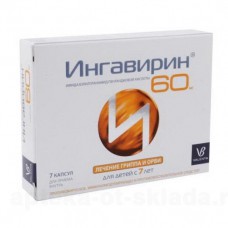Expiration date: 01/2026
Composition
One capsule contains:
Active substance: imidazolylidene pentandiol acid (betaglucan)in terms of 100% substance — 60 or 90 mg.
Excipients:
lactose (milk sugar), potato starch, colloidal silicon dioxide (Aerosil), magnesium stearate. Solid gelatin capsules (titanium dioxide, gelatin).
The composition of the capsule shell: titanium dioxide, quinoline yellow azorubin, crimson dye (ponso 4R), gelatin.
Pharmacological action.
Ingavirin is an antiviral anti-inflammatory agent.
Ingavirin has an antiviral effect, is effective against influenza viruses of types A (A/H1 N1, including "swine" A/H1 N1 swl, A/H3N2, A/H5N1), type B, adenovirus infection, parainfluenza, respiratory syncytial infection. The antiviral mechanism of action is associated with the suppression of virus reproduction during the nuclear phase, and the delay in migration of the newly synthesized NP virus from the cytoplasm to the nucleus.
It has a modulating effect on the functional activity of the interferon system: it causes an increase in the content of interferon in the blood to the physiological norm, stimulates and normalizes the reduced a-interferon-producing ability of blood leukocytes, and stimulates the u - interferon-producing ability of white blood cells.
It causes the generation of cytotoxic lymphocytes and increases the content of NK-T cells with high killer activity in relation to cells transformed by viruses and pronounced antiviral activity.
The anti-inflammatory effect of Ingavirin is due to the suppression of the production of key Pro-inflammatory cytokines (tumor necrosis factor (TNF-a), interleukins (IL-1B and IL-6)), and a decrease in the activity of myeloperoxidase.
Therapeutic effectiveness in influenza and other acute respiratory viral infections (ARVI) is manifested in shortening the period of fever, reducing intoxication (headache, weakness, dizziness), catarrhal phenomena, reducing the number of complications and the duration of the disease as a whole.
Experimental Toxicological studies indicate a low level of toxicity and a high safety profile of the drug (LD50 exceeds the therapeutic dose by more than 3000 times). The drug does not have mutagenic, immunotoxic, allergenic and carcinogenic properties, does not have a local irritant effect. Ingavirinr does not affect the reproductive function, does not have embryotoxic and teratogenic effects.
Indications
Treatment and prevention of influenza A and B and other acute respiratory viral infections (adenovirus infection, parainfluenza, respiratory syncytial infection).
Contraindications
Individual intolerance to the components of the drug, pregnancy, children under 7 years of age.
Use during pregnancy and lactation
The use of the drug during pregnancy has not been studied. The use of the drug during lactation has not been studied, so if you need to use the drug during lactation, you should stop breastfeeding.
Special instruction
The drug does not have a sedative effect, does not affect the speed of psychomotor reaction and can be used in people of various professions, including those requiring increased attention and coordination of movements. Simultaneous administration of other antiviral drugs is not recommended.
Effectiveness in children
In a double-blind randomized placebo-controlled multicenter study to evaluate the clinical efficacy and safety of Ingavirin in a daily dose of 60 mg for the treatment of influenza and other acute respiratory infections in 180 children aged 13-17 years, it was shown that Ingavirin significantly exceeded placebo, quickly normalizing body temperature, stopping intoxication, fever, catarrhal phenomena.
A double-blind randomized placebo-controlled multicenter study to evaluate the clinical efficacy and safety of Ingavirin in a daily dose of 60 mg for the treatment of influenza and other acute respiratory infections in 310 children aged 7-12 years showed that Ingavirin has significantly greater effectiveness compared to placebo and provides a faster (on average 18 hours) decrease in body temperature and the disappearance of symptoms of intoxication (sore throat, tickling, pain when swallowing, nasal congestion, runny nose).
Application
Inside.
Regardless of the meal.
For the treatment of influenza and acute respiratory viral infections, children from 7 to 17 years of age are prescribed 1 capsule (60mg) once a day.
The duration of treatment is 5-7 days (depending on the severity of the condition).
Taking the drug begins from the moment the first symptoms of the disease appear, preferably no later than 2 days from the onset of the disease.
This dosage form is not intended for use in persons 18 years and older (it is necessary to use dosage forms that allow Ingavirin to be taken at a dose of 90 mg).
Side effect
Allergic reactions (rare).
Drug interaction
Concomitant use of Ingavirin with other antiviral drugs is not recommended.
There were no cases of interaction of Ingavirin with other drugs.
Storage conditions
In a place protected from children, at a temperature not exceeding 25°C.
Shelf life-3 years. Do not use after the expiration date.




